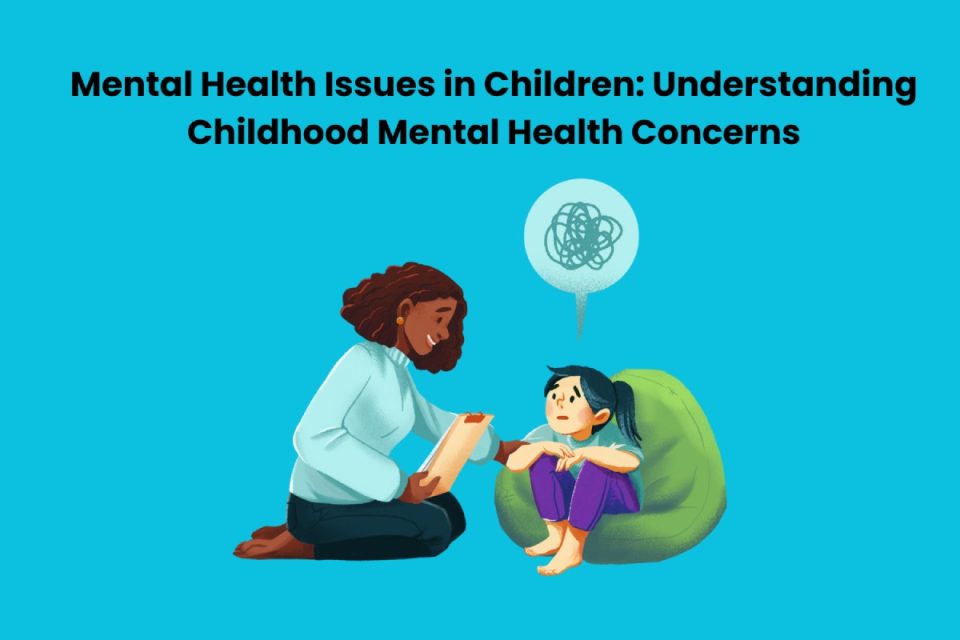Mental health issues in children are a growing concern that requires attention and understanding from both parents and professionals. As part of mental health courses, understanding these issues is crucial for early identification and intervention. In this blog, we will explore the landscape of childhood Mental Health Issues, their impact, and the importance of addressing them through Mental Health Course and early intervention strategies.
Table of Contents
The Prevalence of Childhood Mental Health Issues
A child’s behaviour, emotional health, and capacity to carry out everyday tasks are all impacted by a wide variety of illnesses that fall under the umbrella of childhood mental health concerns. These problems may take many different forms, such as autism spectrum diseases, attention-deficit/hyperactivity disorder (ADHD), anxiety disorders, and depression. The Centres for Disease Control and Prevention (CDC) estimate that one in six children between the ages of two and eight has a developmental, behavioural, or mental illness.
The Impact of Childhood Mental Health Issues
Problems with mental health in childhood may have a big influence on a kid’s growth, learning, socialisation, and general quality of life. Childhood mental health problems that go untreated may have long-term effects on a person, such as poor academic performance, social isolation, drug misuse, and a higher chance of developing mental health disorders as an adult. Early identification and treatment of these problems is essential to reducing their effects and fostering favourable outcomes for mental health.
Understanding Childhood Mental Health Concerns
Professionals must be equipped with the information and abilities necessary to comprehend and manage mental health issues in children, and this is where mental health courses come in. These courses include information on risk factors, protective factors, assessment instruments, and evidence-based therapies related to the emergence of mental health problems in children. Professionals with training in mental health are more equipped to identify the warning signs of mental health problems in kids, perform evaluations, and work in tandem with families and other medical specialists to provide all-encompassing treatment.
Common Mental Health Issues in Children
Children may be impacted by several prevalent mental health conditions, each with specific traits and difficulties. Among the most common mental health conditions affecting children are anxiety disorders, such as phobias, separation anxiety disorder, and generalised anxiety disorder. Excessive anxiety, fear, avoidance behaviours, and physical symptoms like headaches or stomachaches may all be signs of these diseases.
Children with depressive disorders may exhibit symptoms such as chronic melancholy, irritability, disinterest in activities, changes in eating or sleep patterns, and suicidal or self-harming thoughts. Inattention, hyperactivity, and impulsivity are the hallmarks of ADHD, which may make it difficult for a kid to concentrate, obey rules, and maintain behavioural control.
Neurodevelopmental diseases known as autism spectrum disorders impact behaviour and social communication. Children diagnosed with autism spectrum disorder may struggle with limited interests, repetitive behaviours, and social interactions.
The Importance of Early Intervention
Effectively treating mental health concerns in children requires early intervention. Courses on mental health place a strong emphasis on the value of early detection and intervention to stop symptoms from becoming worse and lessen the influence that mental health problems have on a child’s life. Psychoeducation, counselling, behavioural therapy, medication management (if required), and family support services are a few examples of early intervention options.
The Role of Mental Health Courses in Addressing Childhood Mental Health Issues
The purpose of mental health courses is to provide professionals with specialised training in recognising, comprehending, and meeting children’s mental health needs. These courses address a variety of subjects, including evidence-based therapies, child development, psychopathology in children, assessment methods and tools, and working with families and other professionals. Professionals may acquire the information and abilities required to provide complete treatment and support for kids with mental health issues by completing mental health courses.
Conclusion
Parents, schools, and mental health experts need to pay close attention to and take action about childhood mental health difficulties. Courses on mental health are essential for providing professionals with the information and abilities they need to identify, comprehend, and successfully handle these problems. We can enhance children’s long-term results and promote their mental health by encouraging early detection and intervention.

